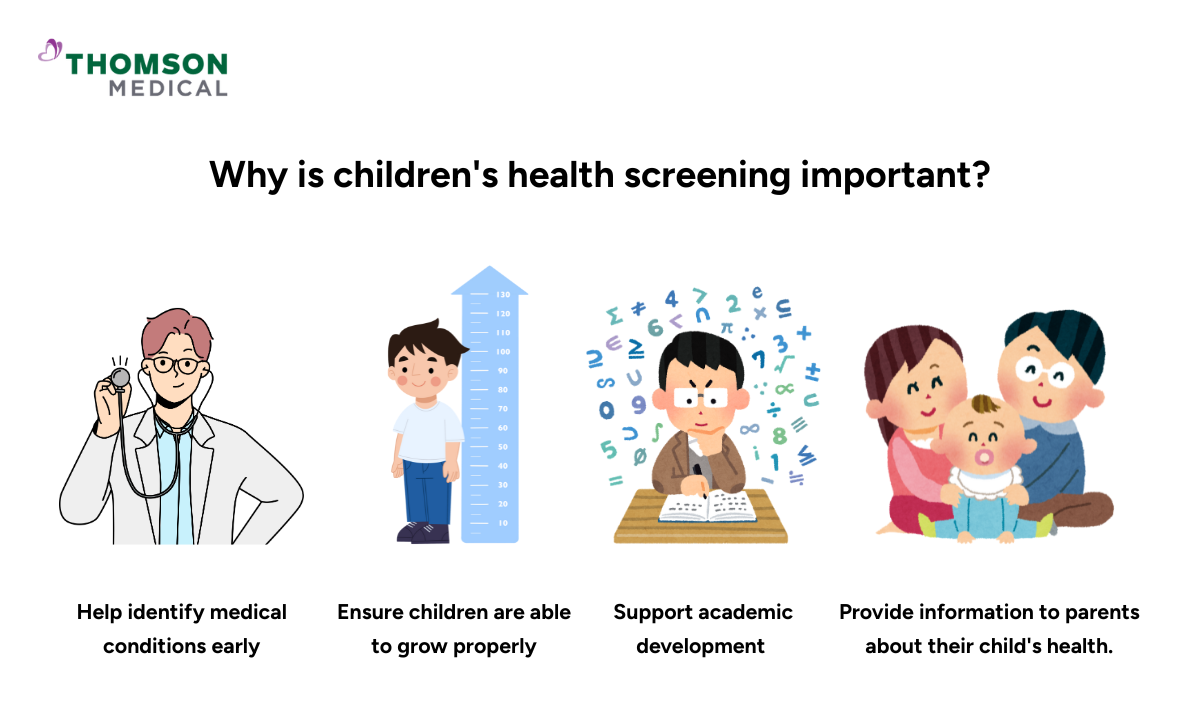What is children's health screening?
A children's health screening is a set of medical examinations and evaluations aimed at monitoring a child's growth and overall health. These tests also help detect potential health concerns early, ensuring timely intervention, treatment, and support for proper development.
The health screening will include checks for body mass, height, vision, hearing, and other developmental factors. In Singapore, parents can select between different healthcare providers, including public and private hospitals, polyclinics, and general practitioners.
The Health Promotion Board (HPB) also conducts annual health screening services and vaccinations for children in primary and secondary schools as part of its Youth Preventive Health Services. School health teams visit schools to conduct necessary health checks as part of the national preventive health strategy.
Why is children’s health screening important?

Regular health screenings are important for children because these tests are able to:
Help identify medical conditions before symptoms appear
Ensure children meet growth and developmental milestones
Prevent long-term complications from undiagnosed conditions
Support academic and social development by addressing health-related challenges early
Prevent the detrimental effects of a sedentary lifestyle on children, such as poor nutrition, increased risk of obesity, and impaired cognitive development
Provide parents with guidelines regarding the well-being of their children
Available health screenings for children in Singapore
In Singapore, there are various health screening packages available for children. These screenings can help detect potential health issues, monitor developmental milestones, and assess for any growth delays. Depending on the testing location, these packages may include one or more of the following tests:
Height and weight measurements
To ensure healthy development, a healthcare professional will usually perform a height and weight screening to assess the child’s physical growth. These checks help to identify any concerns relating to growth patterns or weight management.
The screening looks at factors such as height, weight and head circumference to evaluate children's growth and development. Growth monitoring tests can also be performed to detect potential issues such as obesity, malnutrition, or growth disorders.
During these assessments, a child’s height and weight are measured, and their body mass index (BMI) is calculated. The results are then compared to those of other children of the same age and sex. This process helps identify whether a child is underweight, a healthy weight, overweight or obese.
Eye test
The aim of an eye test for children is to detect and correct vision problems early on, before they cause learning difficulties or affect their quality of life. Some of the tests that may be performed include:
A visual acuity test to measure visual acuity (normal vision), which is usually performed using a Snellen chart. Children are asked to read letters from a distance to assess their ability to see at different distances.
A refraction test determines whether a child is short-sighted (where distant objects appear blurry), far-sighted (where close objects appear blurry), or has astigmatism (where vision is blurred or distorted at all distances).
A vision examination is also performed to check for eye health and early signs of strabismus (misaligned eyes), amblyopia (lazy eye), and refractive errors.
Hearing test
Hearing tests, also known as audiometry tests, are assessments performed by audiologists (hearing specialists) to measure a child's ability to perceive different sounds, pitches, and frequencies.
These tests can identify hearing impairments that could affect a child's future speech, language, and learning development. Early detection and treatment of hearing issues ensure that your child's learning will not be affected. The following tests may be performed:
Otoacoustic emissions (OAE) is a common hearing test for children. This test assesses the function of the inner ear by inserting a small probe and measuring the sound waves produced by the cochlea, a spiral-shaped, fluid-filled cavity in the inner ear that plays a key role in hearing.
Pure tone audiometry is used to determine the softest sounds that children can hear at different pitches and frequencies.
Tympanometry measures how well the eardrum moves and can detect middle-ear problems, such as fluid buildup, infection, earwax blockage, or perforation of the eardrum.
Urine and blood tests
Urine and blood tests offer important details about a child’s overall health, helping to detect health issues and underlying medical conditions.
A urinalysis involves examining the appearance of urine and checking for blood cells, proteins, and other substances. This test can be used to look for early signs of infection, kidney disease, or liver disease.
A complete blood count (CBC) measures red blood cells, white blood cells, and platelets and is used to evaluate a child's overall health and screen for anaemia, infections, and other blood-related conditions.
Lead screening is used to test children at risk of lead exposure due to environmental factors.
Children who are obese or have high cholesterol may undergo blood sugar and cholesterol tests to assess their future risk.

Developmental assessments
These tests ensure that children meet the required health parameters for speech, movement and social skills. It is usually carried out during routine health checks at 9, 18, and 24 to 30 months of age.
A developmental assessment is used by the healthcare provider to identify conditions such as autism, ADHD, or speech delays.
Other screening tests
Depending on the child's risk factors and health history, additional health check-ups may be required, which could include:
A dental examination to prevent cavities and allow for the early identification of dental issues.
A scoliosis screening checks for abnormal curvature of the spine, which can form an "S" or "C" shape. Scoliosis is a spinal deformity that is distinct from poor posture, and it most commonly appears in school-aged girls.
Allergy testing is performed on children who experience persistent allergic reactions to identify specific triggers and guide appropriate management.
The information provided above is intended for general reference only. To learn more about these health screenings and determine which one is suitable for your child, request an appointment with Thomson Medical.
Government program for children's health screening
The Singaporean government actively supports children's health through structured national programmes. One such initiative is Grow Well SG, which targets children up to the age of 12.
The programme addresses the negative effects of modern sedentary lifestyles, such as excessive screen time, lack of physical activity, and inadequate sleep on children’s cognitive, social, and physical development.
Grow Well SG integrates annual school health screenings with a personalised holistic approach to create a tailored lifestyle prescription for each child. The prescription is based on the results of a pre-screening child lifestyle questionnaire completed by parents and vaccination reports.
Children with health conditions, such as being overweight or having abnormal blood sugar or cholesterol levels, may be referred to public healthcare institutions or enrolled in a healthy lifestyle programme.
For a detailed overview of these initiatives and their benefits for your child, please refer to the website of Singapore's Ministry of Health (MOH).
FAQ
Can kids do health screening?
Yes, children in Singapore are encouraged to undergo child health screenings. These screenings play a vital role in preventive care and the early detection of health issues or developmental delays.
Screenings are available at polyclinics, Community Health Assistance Scheme (CHAS) GP clinics, and private clinics, as well as through government programmes such as Grow Well SG. This method ensures that children receive timely support for healthy growth and development.
What is a screening test for children?
A children health screening is a medical evaluation designed to identify potential health issues early on and allow for timely intervention. These tests typically include:
- Vision and hearing assessments to detect sensory issues early
- Growth monitoring to track height, weight, and head circumference
- Developmental assessments to monitor milestones in movement, language, and social skills
- Blood tests to screen for anaemia, infections, or other medical conditions
What is a screening test for child development?
A child development screening test is an assessment that evaluates a child’s physical, cognitive, linguistic, and social-emotional development. It helps identify poor development in areas such as speech, motor skills, and social interactions.
In Singapore, developmental screenings are conducted at specific milestones during routine health checks. Early identification enables timely intervention if delays are detected.
What is a CBC screening for children?
A complete blood count (CBC) is a blood test that measures the number of red and white blood cells, haemoglobin, and platelets in the blood. In children, a CBC can help to screen for anaemia, infections, and other issues with the immune system.
It provides vital information about a child's health status and is usually carried out if a child exhibits symptoms such as fatigue, frequent infections, or unusual bruising.
How do I choose a screening test for my child?
The most appropriate screening test for your child depends on various factors, such as their age, health, family history, and any specific risk factors they may have.
The best way to ensure your child receives timely and appropriate health screenings is therefore to have regular consultations with their healthcare provider. This will help improve and maintain their quality of life.
What is the recommended age for children's health screening?
In Singapore, health screening for children is recommended from birth and continues regularly throughout early childhood. The Ministry of Health advises that all children undergo childhood developmental screenings (CDS) at specific ages to monitor growth, development, and general health.
There are seven key CDS touchpoints covering the first six years of your little one's life:
- 4 weeks (1 month)
- 3 or 4 months
- 6 months
- 12 months (1 year)
- 18 months (1.5 years)
- 30 months (2.5 years)
- 48 months (4 years)
During each appointment, healthcare professionals will assess your child's growth (height, weight, and head circumference) and physical health, as well as developmental milestones in areas such as movement, speech, and social skills. These screenings are usually conducted along with the national childhood immunisation schedule (NCIS).
This information is intended as general guidance only and should not be considered as medical advice. For personalised health screening recommendations based on your children's medical conditions, request an appointment with Thomson Medical.
